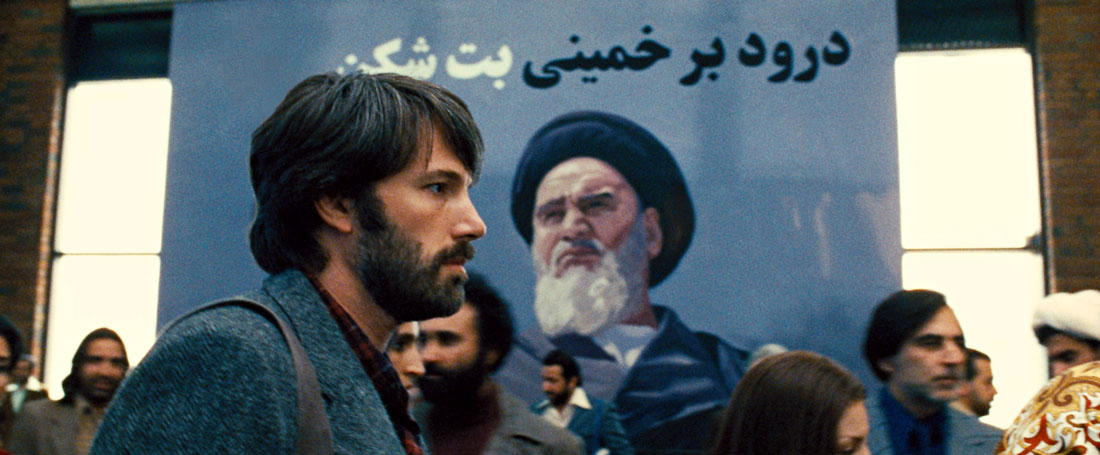By coincidence, the titles of both movies this week refer to movies within the movies. Neither Argo nor Seven Psychopaths is really about the filmmaking process — the first throws up a nonexistent movie as a smokescreen for a spy mission, and the second examines our need to make sense of the world by telling stories. They are worth checking out for different reasons.
On paper, Argo is something surefire. It’s based on a true story that was declassified only 15 years ago, an intriguing sidelight to a well-known incident from American history. While the story couldn’t be more serious, it’s also full of incidents that are too crazy to be made up. It’s an ode to American perseverance and ingenuity, with a tribute to the courage of our neighbors to the north. As such, it will appeal to Americans everywhere on the political spectrum (except for Islamist militants). I found it all highly watchable, and yet I found it missing something.
The film begins with a tense re-enactment of the 1979 storming of the U.S. embassy in Tehran by Iranian revolutionaries. While most of the Americans inside are being taken hostage, six employees escape out a back exit and are sheltered by Canadian Ambassador Ken Taylor (Victor Garber), who hides them in his house. Ten weeks later, CIA extraction specialist Tony Mendez (Ben Affleck) is briefed on the situation so he can advise U.S. State Department officials on their plans to extricate the Houseguests, as the escapees are known. Tony thinks little of State’s harebrained schemes and instead comes up with an inventive but insanely risky one: He’ll fly into Iran pretending to be a Canadian movie producer scouting filming locations for a Star Wars rip-off called Argo and spirit the Houseguests out of the country by having them pose as his film crew. As Tony’s CIA boss (Bryan Cranston) puts it, “This is the best bad idea we have, by far.”
This is the third film that Affleck has directed, and it solidifies his reputation as a maker of sturdy, intelligent, pulpy thrillers. From the moment that Tony lands in Tehran and sees the corpses of the Shah’s loyalists hanging from construction sites, the film slowly builds tension and does not let up until the end. The director knows how to spot a telling detail amid the chaos; early on we see a puddle of blood on the street that one of the Houseguests steps in during their flight from the embassy. Fraught sequences fall fast upon one another in the later going, as Tony’s handlers in Washington frantically try to confirm everyone’s airline reservations in time and the most troublesome Houseguest (Scoot McNairy) pulls the group out of a jam by detailing the plot of Argo in Farsi to a bunch of gun-toting soldiers. In these scenes and the movie as a whole, Affleck’s application of craft is exact and ruthless.
Too ruthless, in fact. Unlike many actors-turned-directors who tend to be too indulgent toward their casts, Affleck has always been about keeping the story moving. Here, though, he seems to have swung too far in that direction. Argo lacks the personality that was bursting from his previous two films, Gone Baby Gone and The Town. This might be because of Chris Terrio’s script — this is the first time Affleck has directed a movie without also co-writing it. The Houseguests are all barely sketched in, and Tony himself, a sad sack with a rocky marriage, isn’t a compelling figure at the center. Affleck’s undistinguished performance in the lead role doesn’t help.
Which is why we’re so grateful to the shaggy-dog comedy in the first half of the film, when Tony flies to Hollywood to establish his cover and enlists the aid of a washed-up producer (Alan Arkin) and an Oscar-winning makeup artist (John Goodman). This part of the film feels lifted from another movie entirely and doesn’t make as much as it should from the spectacle of a CIA spy trying to fit in with science-fiction geeks in Tinseltown. Even so, it lets Arkin and Goodman take over the film for a while, firing off zingers about the movie industry and injecting some welcome humor. Arkin gets a nice scene when the producer breezily bullshits his way through a meeting with a rival producer (Richard Kind) who owns the rights to Argo’s script. The Hollywood hijinks ping with a scene later on when Tony coaches the Houseguests on maintaining their cover identities as if they’re novice actors learning how to build a character.
If the aim is to draw a parallel between the artifice of Hollywood and the spy trade, Argo never quite comes together, but it is a well-executed thriller that tells a true story in entertaining fashion. The spoken epilogue over the end credits, with Jimmy Carter paying tribute to the real-life Mendez, is a nice touch, too.
It’s hard to do gleefully bloody comic violence, as we’ve seen from Quentin Tarantino’s many failed imitators. So it’s instructive to see Martin McDonagh’s flair for it. The Irishman first established this as a playwright (The Beauty Queen of Leenane, A Behanding in Spokane) before making a notable debut as a filmmaker with his 2008 comic thriller In Bruges. McDonagh’s second movie, Seven Psychopaths, finds him still getting a handle on film narrative. Nevertheless, seeing his Guinness-spiked wit transplanted to an American setting still makes for a good dose of amoral fun.
Seven Psychopaths is also the title of a script being written by Martin (Colin Farrell), a hard-drinking Irish hack screenwriter in Hollywood whose feckless actor buddy Billy (a whacked-out Sam Rockwell) keeps angling for a part in his movie. Unhappily, Billy also has a sidelight with a shady friend named Hans (Christopher Walken) in which they kidnap dogs and then return the “lost” pets to their owners in exchange for a reward. One of their recent kidnap victims is a Shih Tzu belonging to a brutal mob boss (Woody Harrelson) who loves his little dog so much that he wants to torture and murder the bastards who’ve taken it. Martin is dragged into the resulting carnage, and as the bodies pile up around them, the three men and the Shih Tzu hide out in the Arizona desert, taking peyote, telling stories of psychopaths past and present, and working on Martin’s screenplay. Actually, the Shih Tzu doesn’t do any of the last three things. Wouldn’t that have been cool, though?
The seven psychopaths mentioned in the titles don’t exactly correspond with this movie’s seven main characters, who also include Martin’s passive-aggressive Australian girlfriend (Abbie Cornish), Billy’s improbably hot Russian girlfriend (Olga Kurylenko), and a weird old dude (Tom Waits) who shows up on Billy’s doorstep stroking a rabbit. The film is full of self-reflexive jokes, like a discussion of Martin fulfilling the drunken Irishman stereotype. Hans’ last name is Kieslowski (a sop to the cinephiles there), and he criticizes Martin’s early draft on the grounds that Martin doesn’t know how to write women. You could fairly apply that criticism to most of the women in this movie, and yet there is a tense scene in which the mob boss confronts Hans’ ill wife in her hospital room. She’s played by Linda Bright Clay, a gray-haired stage veteran in her first film role, who with that one scene outdoes many of her more famous male co-stars here.
McDonagh pulls off a coup with the reveal of the last psychopath, which is a genuine shock. Elsewhere, he’s not much for plotting. The movie loses focus as it moves to the desert, and though this is meant to reflect the way that Martin loses control of his script, it still brings the proceedings to a halt. McDonagh runs into a thicket (a figurative one, not a literal thicket like you might find in the desert) trying to distinguish between movie violence and real-world violence.
On the other hand, the filmmaker excels at writing funny dialogue for these odd small-time criminals. The comic highlights include Billy’s deconstruction of Gandhi’s “an eye for an eye leaves the whole world blind” adage, a surreal script idea involving a Vietnamese priest and a hooker, and Hans’ simple refusal to comply with a gun-toting henchman (Zeljko Ivanek) who demands that he put his hands up. Seven Psychopaths may not add up to a whole lot, but McDonagh makes these small-time strivers and hoods fun to be around for a couple of hours.
[box_info]
Argo
Starring Ben Affleck, John Goodman, and Alan Arkin. Directed by Ben Affleck. Written by Chris Terrio. Rated R.
Seven Psychopaths
Starring Colin Farrell, Sam Rockwell, and Christopher Walken. Written and directed by Martin McDonagh. Rated R.
[/box_info]












